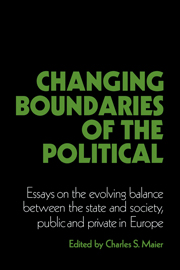 Changing Boundaries of the Political
Changing Boundaries of the Political Published online by Cambridge University Press: 05 June 2012
The budget as mirror
The shifting boundaries between the political and the private are reflected in the ratio (hereafter rendered G/Y) of government expenditures to the national income. In this sense the budget can be seen, according to Kurt Heinig, as a mirror of the sociopolitical situation. If taken lightly, this image is illuminating. Upon reflection, it becomes dubious. One might say that the mirror is funny: Important types of government intervention (cruel prosecution under a dictatorship) can be introduced or abolished without government expenditures showing what is happening. Regulatory power in economic affairs is not necessarily proportional to the number of government employees. On the other hand, some substantial increases in public outlays reflect not so much increasing government operations as transfers between citizens, for instance, the prosperous expansion of the grants economy. Another shortcoming of G/Y as a measure of the balance between the activities of governments and governed is that budgets do not reveal the full size of activities on behalf of the authorities, which are often costly. For instance, the labor of the tax-filing, tax-paying citizen is nowhere registered. As shifts between the public and the private domain are occurring in opposite directions it is not certain that their net impact is truly measured by the increase in G/Y. The recent retreat of some European governments on the issues of abortion, homosexuality, and pornography did not lead to a significant decrease in government outlays; but the substantial advance in education, housing, and welfare did lead to strong and sometimes explosive increases.
To save this book to your Kindle, first ensure [email protected] is added to your Approved Personal Document E-mail List under your Personal Document Settings on the Manage Your Content and Devices page of your Amazon account. Then enter the ‘name’ part of your Kindle email address below. Find out more about saving to your Kindle.
Note you can select to save to either the @free.kindle.com or @kindle.com variations. ‘@free.kindle.com’ emails are free but can only be saved to your device when it is connected to wi-fi. ‘@kindle.com’ emails can be delivered even when you are not connected to wi-fi, but note that service fees apply.
Find out more about the Kindle Personal Document Service.
To save content items to your account, please confirm that you agree to abide by our usage policies. If this is the first time you use this feature, you will be asked to authorise Cambridge Core to connect with your account. Find out more about saving content to Dropbox.
To save content items to your account, please confirm that you agree to abide by our usage policies. If this is the first time you use this feature, you will be asked to authorise Cambridge Core to connect with your account. Find out more about saving content to Google Drive.